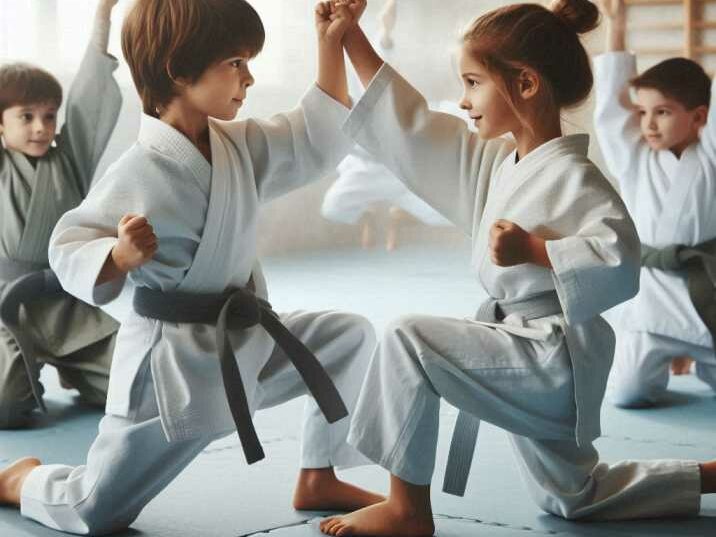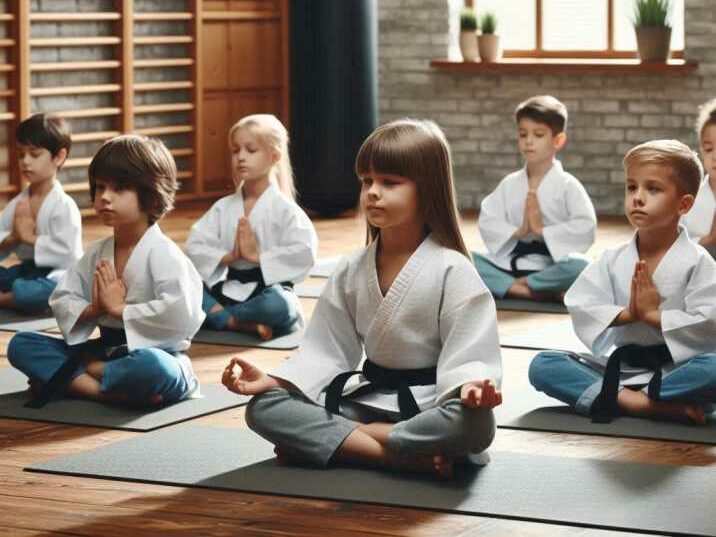Introduction:
Table of Contents
In contemporary society, where the pressures and stresses of daily life can weigh heavily on young minds, the significance of martial arts as a therapeutic avenue for children’s mental health cannot be overstated. This comprehensive article delves into the multifaceted benefits of martial arts beyond physical fitness, exploring its profound impact on emotional regulation, confidence building, discipline cultivation, and social skill enhancement.

I. Understanding the Therapeutic Role of Martial Arts
In the realm of mental health, martial arts serves as a sanctuary where children learn invaluable skills for emotional regulation and stress management. Through structured training sessions, which incorporate elements of meditation, breathing exercises, and mindfulness techniques, young practitioners develop a heightened sense of self-awareness and learn to navigate their emotional landscape with resilience and composure.
Martial Arts and Emotional Regulation
The practice of martial arts provides children with a toolkit for managing their emotions effectively. Techniques such as controlled breathing and meditation foster a state of calmness and centeredness, enabling them to respond to challenging situations with clarity and control.
Mental Health Benefits of Physical Activity
Beyond its therapeutic aspects, engaging in regular physical activity through martial arts offers a myriad of mental health benefits. Studies have shown that physical exercise stimulates the release of endorphins, neurotransmitters responsible for feelings of happiness and well-being, thereby alleviating symptoms of anxiety and depression.
II. Building Confidence and Self-Esteem
One of the most profound effects of martial arts training on children is the bolstering of confidence and self-esteem. As young practitioners progress through their journey, mastering new techniques and overcoming obstacles, they develop a profound sense of self-assurance and belief in their abilities.
Mastery of Skills
The incremental progression inherent in martial arts training fosters a sense of accomplishment with each milestone achieved. Whether mastering a new form or earning a higher belt rank, these achievements serve as tangible evidence of their growth and capability, reinforcing their self-esteem.
Overcoming Adversity
In the dojo, children learn that failure is not a setback but rather a stepping stone to success. Through perseverance and determination, they cultivate resilience in the face of adversity, learning to embrace challenges as opportunities for growth rather than insurmountable obstacles.
III. Fostering Discipline and Focus
Central to the ethos of martial arts is the cultivation of discipline and focus, virtues that are indispensable in both training and daily life. Within the structured environment of the dojo, children learn the importance of adhering to rules and regulations, fostering a sense of responsibility and self-discipline.
Structured Learning Environment
Martial arts classes provide a structured framework for learning, where children must follow instructions and demonstrate respect for their instructors and fellow practitioners. This disciplined approach instills a sense of order and accountability, which translates into other areas of their lives.
Mindfulness and Awareness
The practice of martial arts emphasizes the mind-body connection, encouraging children to be fully present in the moment. Through focused attention on their movements and surroundings, they develop heightened levels of awareness and concentration, skills that are invaluable in navigating the complexities of modern life.
IV. Cultivating Emotional Resilience
In a world fraught with challenges and uncertainties, emotional resilience is a critical asset that enables children to weather the storms of life with grace and fortitude. Through the trials and tribulations of martial arts training, they learn to embrace failure as a natural part of the learning process and to bounce back stronger than before.
Handling Conflict and Bullying
Martial arts equips children with the confidence and assertiveness to stand up to bullying and effectively navigate conflict situations. By teaching them non-violent resolution strategies and promoting empathy and understanding, it empowers them to assert their boundaries and advocate for themselves and others.
Embracing Failure as a Learning Opportunity
In martial arts, setbacks are viewed not as defeats but as opportunities for growth and self-improvement. By reframing failure as a natural and necessary part of the learning journey, children develop resilience and a growth mindset, enabling them to persevere in the face of adversity.
V. Enhancing Social Skills and Peer Relationships
The camaraderie and sense of community fostered within martial arts schools provide a supportive environment for children to develop their social skills and forge meaningful connections with their peers. Through collaborative training exercises and group activities, they learn the value of teamwork, communication, and cooperation.
Sense of Community
Martial arts schools often function as tight-knit communities where children form lasting friendships and bonds with their fellow practitioners. This sense of belonging fosters a supportive environment where they feel accepted, valued, and encouraged to grow.
Peer Interaction and Cooperation
Partner drills and group exercises in martial arts classes encourage children to work together towards common goals, fostering a spirit of cooperation and mutual respect. These interactions provide invaluable opportunities for them to hone their interpersonal skills and develop empathy and understanding towards others.
VI. Additional Benefits of Martial Arts Training for Children
In addition to the core therapeutic aspects discussed above, martial arts training offers a range of other benefits that contribute to children’s overall well-being:
Cognitive Benefits
Martial arts training involves memorizing sequences of movements, which can enhance children’s cognitive abilities such as memory, attention, and problem-solving skills.
Character Development
Martial arts places a strong emphasis on virtues such as respect, humility, and perseverance, which are integral to the development of good character and moral values in children.
Physical Fitness
In addition to mental health benefits, martial arts also contributes to children’s physical fitness by improving strength, flexibility, balance, and coordination.
Inclusivity and Diversity
Martial arts schools often embrace diversity and welcome students from all backgrounds, fostering a culture of inclusivity and acceptance.
Self-Defense Skills
While the primary focus of martial arts is not on violence, children learn practical self-defense techniques that can empower them to protect themselves in threatening situations.
Parental Involvement
Martial arts training provides an opportunity for parents to bond with their children through shared activities and experiences, fostering stronger parent-child relationships.
Long-Term Benefits
The skills and lessons learned through martial arts training can have a lasting impact on children’s lives, providing them with tools for success both in their personal and professional endeavors.

Table of Information Martial Arts for Mental Health:
| Benefit | Description |
|---|---|
| Emotional Regulation | Techniques such as breathing exercises and meditation promote relaxation and stress reduction. |
| Confidence and Self-Esteem | Mastery of skills boosts self-esteem and confidence, empowering children to tackle challenges. |
| Discipline and Focus | Structured learning environment instills discipline and teaches the importance of focus. |
| Emotional Resilience | Handling setbacks and failures fosters emotional resilience and a growth mindset. |
| Social Skills | Sense of community and peer interaction in martial arts classes enhance social skills. |
Conclusion:
In conclusion, martial arts emerges as a potent therapeutic modality for supporting children’s mental health, offering a holistic approach that addresses the physical, emotional, and psychological dimensions of well-being. From promoting emotional regulation and self-esteem to fostering discipline and resilience, the benefits of martial arts extend far beyond the confines of the dojo, empowering children to navigate life’s challenges with confidence, resilience, and inner strength.
FAQs (Frequently Asked Questions):
- What age is suitable for children to start practicing martial arts? Answer: Children as young as 4 or 5 can start martial arts training, but it ultimately depends on their individual readiness and maturity.
- Is martial arts suitable for children with behavioral issues? Answer: Yes, martial arts can be beneficial for children with behavioral issues as it helps instill discipline, self-control, and emotional regulation.
- Are there different types of martial arts suitable for children? Answer: Yes, there are various types of martial arts such as karate, taekwondo, and judo, each with its own unique benefits and training methods.
- How often should children attend martial arts classes? Answer: It is recommended for children to attend martial arts classes at least 2-3 times per week to experience the full benefits of training.
- Can martial arts help children build confidence to stand up to bullying? Answer: Yes, martial arts empowers children with the confidence and assertiveness skills to stand up to bullying and effectively handle conflict situations.


